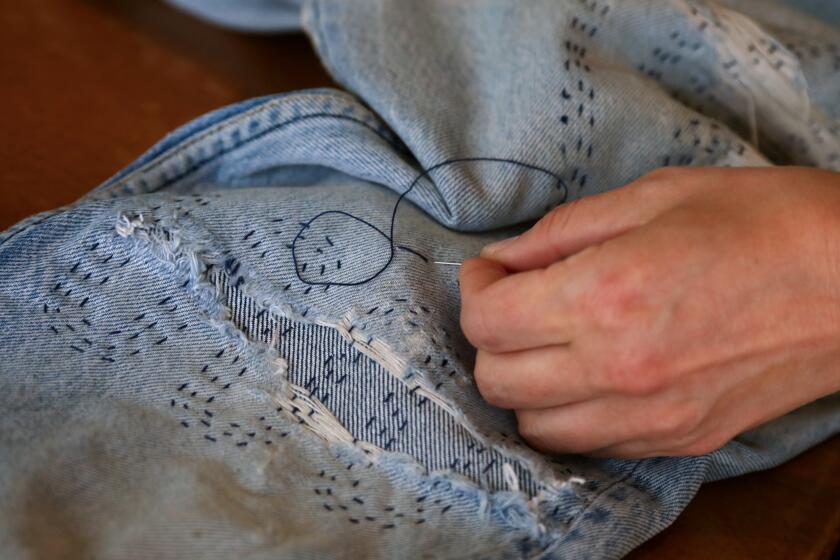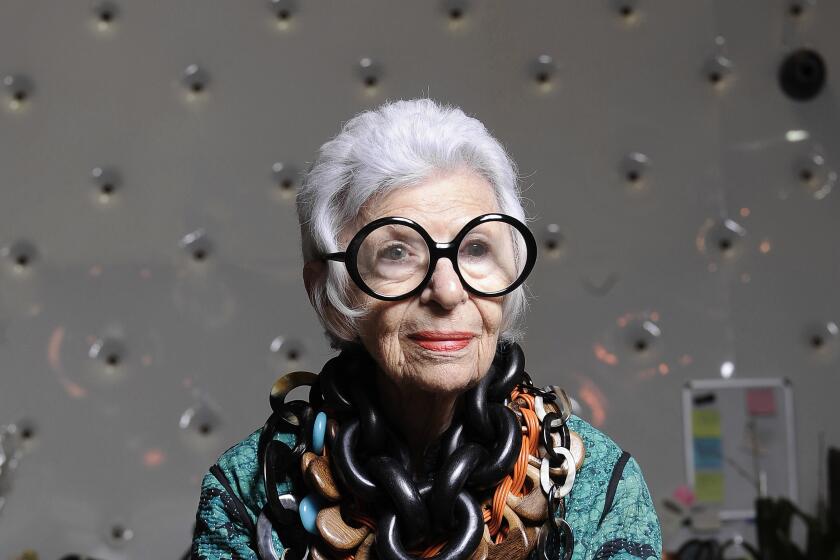Web Firms Offer a Stage for Business of Self-Expression
Self-expression is helping put Bobbi Barbour through college.
The 22-year-old Torrance resident tried making handbags and selling them through her website, Dollfacepunk.com, but the work wasn’t worth the meager revenue.
Last year she found CafePress.com, a service that turns people’s ideas into merchandise. She designs the T-shirts, and the Web company does almost everything else in exchange for a cut of the proceeds. The El Camino College student has already netted nearly $18,000 this year, selling clothes that generally feature 1950s-style images of women with ironic slogans, such as “Men, Coffee & Chocolate: All Better Rich.”
“I’m making decent money doing virtually nothing, just putting designs up there,” said Barbour, who also works part time at a swimsuit shop. “I make more on Cafe Press than I do going to my job four days a week.”
Customization for the masses is what many prognosticators thought the Web would allow a decade ago. But it required companies on the back end to assemble the products and handle shipping -- things individuals and small companies have trouble affording -- to make it widespread.
Companies such as Cafe Press and competitor Zazzle .com are becoming a broader platform for commerce, much as EBay Inc. did. The concept behind these services is what some participants and observers call “micro-entrepreneurialism,” or “the everyone economy.”
Flea markets, printing stores and kiosks in shopping malls have long offered services that let people create “World’s Best Dad” T-shirts and other custom items. The difference with Cafe Press and Zazzle is that these custom designs can suddenly be marketed and sold to millions of Web surfers with virtually no overhead. And each customer can select something a little bit different that is made to order.
“What it comes down to is hundreds of thousands of markets of dozens, instead of dozens of markets of hundreds of thousands,” said Kent Allen, principal of Research Trust, a San Francisco-based strategic consulting and research firm for e-commerce companies.
These websites let users create custom T-shirts, mugs, posters, stickers and scores of other objects. Each is emblazoned with an image or slogan dreamed up by a wide range of creators, from budding designers to mid-size apparel businesses to massive media companies such as Walt Disney Co.
Sellers simply upload an image, and these businesses do the rest: Create a listing page, process the order, print the T-shirt or other product, ship it and handle returns.
Cafe Press and Zazzle won’t make the product until it is ordered.
Cafe Press takes a base fee for each item and lets the sellers keep the rest. By contrast, Zazzle pays a 10% commission to “public gallery” contributors whose work gets sold, plus a commission for sellers who direct traffic to Zazzle. Neither of the private companies would disclose revenue or profit.
Both business models have proved attractive to investors such as Sequoia Capital, Kleiner Perkins Caufield & Byers and Sherpalo Ventures, three of the early investors in Google Inc. Sequoia in January led a $14-million round of funding for Cafe Press, and Zazzle announced in July that Kleiner Perkins and Sherpalo had led a $16-million investment.
“I describe it as a marketplace for creativity but one that brings together community,” said Sherpalo founder Ram Shriram.
Theft of intellectual property is a concern for both Cafe Press and Zazzle, but the services say they carefully monitor each submission to ensure that people aren’t trying to sell images that are copyrighted by others.
Some customers use the Web services simply to make items for themselves, such as Navy sailors stationed on the Essex, an aircraft carrier in the Persian Gulf, who recently ordered T-shirts through Zazzle for their intramural basketball tournament.
But the service also can help sloganeers spread the next “Have a nice day” bumper sticker or variation of “What would Jesus do?” baseball cap.
Sellers can get up and running as quickly as they can brainstorm a slogan or create an image. When New York City police began searching subway riders’ bags after the London bombings in July, one group of New Yorkers used Cafe Press to create T-shirts saying, “I do not consent to being searched,” while another’s shirts said, “I do not consent to being blown up.”
Last year, buttons advertising “Kerry’s Flip Flop Shop” were answered after the election by shirts saying, “Don’t blame me, I voted for Kerry.”
“People can sell their units of self-expression,” Allen said.
Cafe Press sprung from a different business venture. The Internet mania of the 1990s was in full swing, and pals Fred Durham and Maheesh Jain were trying to get rich helping companies sell merchandise online.
But individuals kept calling with the strangest notion: They really wanted to sell online too. They didn’t have a process for customer service, billing or shipping. In fact, they didn’t even have any products to sell. All they had was an idea that they thought was a winner.
“We thought they were nuts,” Durham recently recalled.
After getting enough calls, the two entrepreneurs finally realized that what those people were asking for might one day become a bigger business than their standard e-commerce venture.
They started the company out of Durham’s garage in San Leandro, Calif., in 1999, selling customized T-shirts, mugs and mouse pads. Durham’s mother pressed the emblems onto the products. (She has since retired.) Cafe Press has moved into a Foster City, Calif., high-rise and expanded into hats, stickers, aprons, calendars and other objects. This year the founders expect to ship about 3 million items.
Zazzle also was a family affair. Brothers Bobby and Jeff Beaver started a custom-printing website as undergrads at Stanford University after they had trouble getting T-shirts made for a fraternity event. After their hacked-together website showed promise, they brought in their father, Robert, to run the Palo Alto-based company alongside them as chief executive.
Brand-name companies such as Disney have made their copyrighted images available to Zazzle so customers can, for example, create T-shirts with their names on the back and characters from “Finding Nemo” on the front.
But work contributed to the Zazzle community by artists such as Ryan Bliss accounts for 80% of the items sold.
Bliss, 33, a self-taught artist in Towanda, Ill., makes a living selling subscriptions to his website, digitalblasphemy.com, which he started in 1997. There, people can download his intricate computer-generated images to use as backgrounds on their PC desktops.
He often fielded requests for images on CD-ROMs and posters. He met with local printers who told him that he would need to make at least 100 of each design to make it financially feasible, and that he would have to store them in his garage before shipping them himself.
Instead, he uses Cafe Press to sell CDs, mouse pads and T-shirts, and Zazzle to sell large prints (he prefers Zazzle’s image quality).
“There’s no cost other than their cut of the sale,” Bliss said. “It’s a nice little on-the-side business.”






